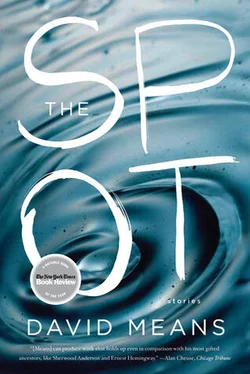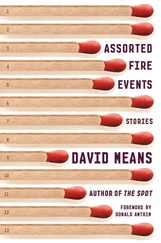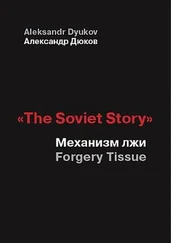That fight about buying Gunner some new toys for the test, he thought, dabbing the sweat from his brow onto his cuff, had really been spurred on by the fact that Sharon was now back in practice, commuting into the city to scrounge clients and taking on a disproportionate number of pro bono cases, as if to keep the financial burden firmly on his side of the ledger, because she felt — and he knew this from their ten years together — that pressure was good for him artistically, and that he’d find the strength to break through to the big time only if he pushed against the weight of their monetary need. So he extracted one toy at a time and watched as Gunner went to the floor, tinkered and fussed and depleted each quickly, and in less than ten minutes had already gone through the Emergency Tow Truck and something called the Question Cube after two lame questions:
What river is in Egypt? the Nile? the Hudson? the Thames? or the Kalamazoo?
And then:
Who said: Sometimes a cigar is just a cigar? Groucho Marx? William Shakespeare? Sigmund Freud? or King Edward?
before the Question Cube gave a weak static snort and faded into silence, so that little Gunner, who was really too young to know the correct answers, but who liked the sound of the toy’s artificial voice — a basso profundo — and got a thrill out of guessing, stood up and, with a grunt, gave it a hard kick. Then he went on to quickly sap the Zinger, a gravity-defying top that was said to have the ability — in correct conditions — to spin eternally, and his old favorite, Mad Hamlet, a strangely compelling action figure that went into suicidal fits when you pushed a button hidden on its back. Only ten minutes in the sweat chamber had gone by, and all Cavanaugh could do was wait a few beats while Gunner looked up, bright with anticipation, and then cried, “I’m hot, I’m hot, I’m hot, hot, hot.”
At this point, stalling for time, Cavanaugh put the rucksack out of sight behind his back and waited a few more beats before pulling it out again, saying, “Hey, hey, look, another rucksack,” and shook it near the boy’s head until he stopped flailing around, looked up with his ruddy face (the kid had what the doctor called dermagraphic skin — highly sensitive, prone to rashes), and said, “Give me, give me.” At which point Cavanaugh unzipped the rucksack slowly and said, “Let’s pretend it’s Christmas morning and we’re just up, having had our traditional morning cocoa and sweet roll”—Christmas was the one morning each year that they opened up the tightly packed dough, popping it against the counter and rolling out the spiral of cardboard foil—“and now Santa’s bringing some new presents,” and then, with great flourish, saying, “Ta da,” he reached in and pulled out the Emergency Tow Truck again, squat and malformed, with a thick front bumper, holding it out and watching as Gunner’s face composed itself around a cry, restrained itself for a second, his tiny mouth a tight rictus of pink next to which his cheeks bunched to reveal a remnant of his original baby face — womb wet with sweat, blue with blood, and dramatically horrific. Cavanaugh searched the boy’s face the way a sailor might read the twilight sky, and saw clearly that he was about to unfurl a squall-cry, a true record breaker on the scream scale. And he did. When it came, it was a squawking, ducklike sound, odd in its guttural overtones, yet paradoxically bright, shiny, and thin, like a drawn thread of hot glass. This was a cry that said: You led me to believe, fully and completely, that I was about to receive a newborn toy, something that would match my deepest expectations. This was a cry that rent open the universe and, in doing so, peeled back and exposed some soft, vulnerable tissue in Cavanaugh’s brain.
So that what he did next was, he thought later, simply an act of self-protection, reaching out and yanking the boy onto his feet and into one arm and then, with the cup of his hand, sealing the kid’s mouth shut, so that all Cavanaugh felt was the small, frail puffs against his palm as he spoke down into the hot, sweaty bloom of struggling face, saying, “Jesus Christ, Daddy was just playing a game, a Christmas game. Daddy was just trying to lighten the situation and keep you from doing what you’re doing right now. Daddy just wants his Gunner to behave himself, if not for the sake of the nurses — who, I’m sure, are out in the hall about to bust in here to see what’s going on — then for Daddy himself, who is at his wits’ end and wants this test to go as smoothly as possible.” At which point, as if on cue, the door opened, bringing in fresh air that smelled of disinfectant and hospital floor polish, and a nurse, beautiful in her tight uniform, with long blond hair, who said, “Oh, dear,” and presented a face, he later thought, that was readable in an infinite number of ways — soft around the mouth, with a wry smile that just about verged on a frown, set in a snowy Nordic topography of bone structure. From the nose down, she seemed to be frank and nonjudgmental, her mouth loose around unavailable words; from the nose up, her two intensely blue eyes and a single raised eyebrow seemed to be saying: Something funny’s going on here. Something’s not right. Something’s deeply wrong about the way you’re cupping the boy’s mouth in relation to the way he (the boy) is standing, in relation to the way you are looming behind him, in relation to the sheen of his terrified face, in relation to that cry I heard out in the hallway, which was so loud and shrill it penetrated the door and reached my ears. And then she tilted her face slightly to one side, glanced at the room (really nothing but two chairs and a heating unit lit with stark neon), and made a face that seemed to admit: Maybe for you, as a father, this is a trying test, though it’s certainly nothing compared with a bonemarrow biopsy, a spinal tap, or the claustrophobia of the MRI ring. But, yes (her face seemed to say), the analysis of the sweat in order to rule out, or to rule in, cystic fibrosis makes it oracular in nature, and in a few hours you, sir, will be offered up the results, and said results might give you a positive yes on the disease, which would mean, of course, that Gunner will face a future of hard breathing, clotted phlegm, and, most certainly, a relatively early death (in his thirties, if you’re lucky), but all this in no way excuses you, sir, from what appeared to be transpiring when I passed the door and heard the cries and stepped in to take a look.
In response to what he seemed to be seeing in her facial expressions, Cavanaugh said, “We’re fine, just a little misunderstanding about the toy bag, the rucksack here, regarding Christmas, pretending it’s Christmas, trying to keep him calm. I mean to say,” he said, as he fingered the dimple on his tie, “I was trying to recharge these toys, so to speak, to make them surprising again, you know, and Gunner became disappointed and began to cry. Not that crying isn’t normal in these circumstances.”
Something stony seemed to enter the nurse’s features as she listened, taking another step into the room, nodding slightly, looking down at the boy and then up at Cavanaugh. Did her eyes narrow slightly? Was there a shift, barely perceptible, in the set of her teeth? Did some interrogative element enter her eyes, brightening the corneas? It seemed to him that she was thinking: We clearly have a situation here. To cup a boy’s mouth like that is wrong, sinful, actually, and just a precursor to more violent acts; God knows what’s going on behind closed doors. And it seemed to him that her face (and the way she moved up to Gunner and touched his head lightly, patting him, and then moved to adjust the collecting device) also said: I’ve seen a thousand such moments, entering rooms to witness patients adjusting their postures, ashamed, awkward around the impersonal equipment, awaiting test results that may change their future. I’ve entered rooms to find patients yanking out IV needles. I’ve opened the door to scenes of fornication, to urine-stained old men with pocked behinds. I’ve opened doors to couples enfolded in weeping embraces, so seized with grief that they had to be pried apart. I’ve opened doors to bald-headed children with angelic eyes and shattering smiles. But this is different because of the cry itself — the desperation and the tonal quality in relation (again) to your unusually guilty face, in relation (once again) to the boy’s self-protective, conspiratorial slack expression, as if he were hiding something, in relation (once again) to the position of the hand held over the mouth, in relation to the finger marks on the flesh around the mouth. Then her lips tightened and her cheekbones — yes, cheekbones! — seemed to sharpen, and her face seemed to say to Cavanaugh: I might have to report this to the resident social worker, just as a matter of protocol. Not because I’m absolutely certain that you struck the child but because I’m not certain , and if I don’t do it and further harm comes to this boy I’ll never forgive myself and I’ll sit forever down in my own particular hell.
Читать дальше












